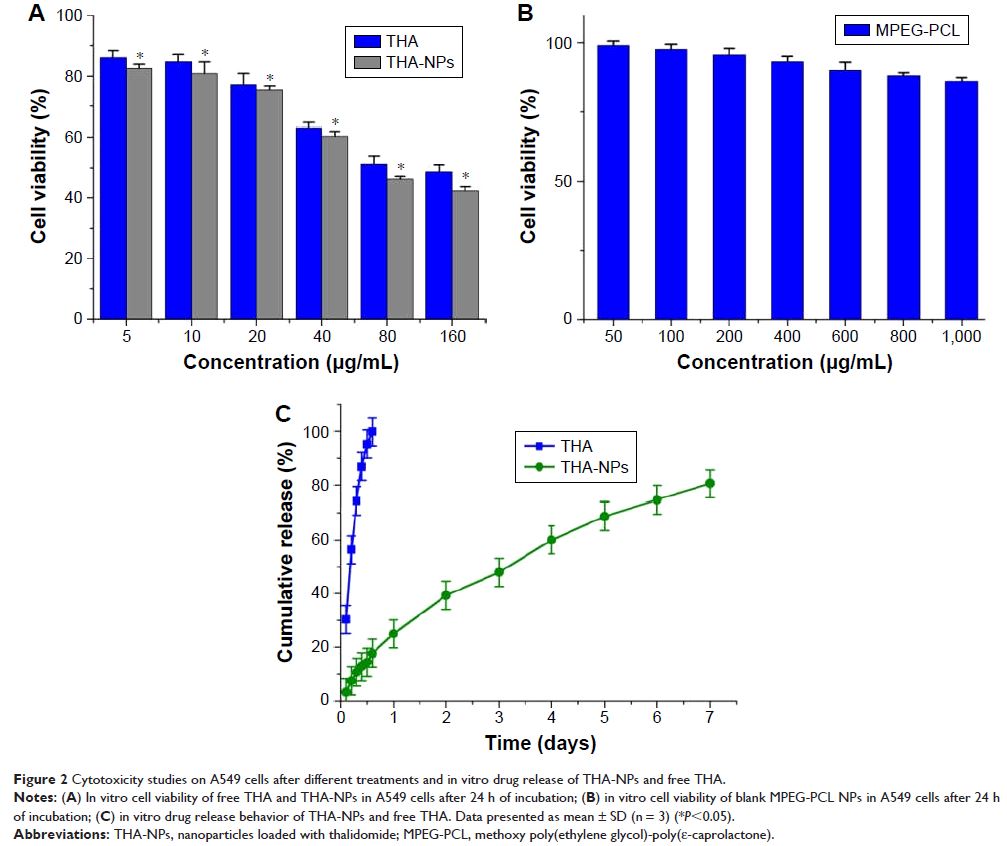108985
论文已发表
注册即可获取德孚的最新动态
IF 收录期刊
- 3.4 Breast Cancer (Dove Med Press)
- 3.2 Clin Epidemiol
- 2.6 Cancer Manag Res
- 2.9 Infect Drug Resist
- 3.7 Clin Interv Aging
- 5.1 Drug Des Dev Ther
- 3.1 Int J Chronic Obstr
- 6.6 Int J Nanomed
- 2.6 Int J Women's Health
- 2.9 Neuropsych Dis Treat
- 2.8 OncoTargets Ther
- 2.0 Patient Prefer Adher
- 2.2 Ther Clin Risk Manag
- 2.5 J Pain Res
- 3.0 Diabet Metab Synd Ob
- 3.2 Psychol Res Behav Ma
- 3.4 Nat Sci Sleep
- 1.8 Pharmgenomics Pers Med
- 2.0 Risk Manag Healthc Policy
- 4.1 J Inflamm Res
- 2.0 Int J Gen Med
- 3.4 J Hepatocell Carcinoma
- 3.0 J Asthma Allergy
- 2.2 Clin Cosmet Investig Dermatol
- 2.4 J Multidiscip Healthc

沙利度胺纳米颗粒的制备、表征,以及对肺癌的体外和体内抗肿瘤作用
Authors Chen L, Ni X, Zhang H, Wu M, Liu J, Xu S, Yang L, Fu S, Wu J
Received 8 December 2017
Accepted for publication 8 March 2018
Published 23 April 2018 Volume 2018:13 Pages 2463—2476
DOI https://doi.org/10.2147/IJN.S159327
Checked for plagiarism Yes
Review by Single-blind
Peer reviewers approved by Dr Govarthanan Muthusamy
Peer reviewer comments 2
Editor who approved publication: Dr Linlin Sun
Introduction: Thalidomide
(THA) is an angiogenesis inhibitor and an efficient inhibitor of the tumor
necrosis factor-α (TNF-α). However, the clinical application of THA has been
limited due to hydrophobicity of the compound.
Materials and
methods: To increase the water solubility of
THA and in order to evaluate the anticancer abilities of this material on human
lung carcinoma, methoxy poly(ethylene glycol)-poly(ε-caprolactone)
nanoparticles loaded with THA (THA-NPs) were prepared. The synthesis of THA-NPs
was carried out via a dialysis method with relative satisfactory encapsulation
efficiency, loading capacity, size distribution, and zeta potential.
Results: A cytotoxicity assay demonstrated that THA-NPs inhibited the
growth of cells in a dose-dependent manner. The evaluation of anti-tumor
activity in vivo showed that THA-NPs could inhibit tumor growth and prolong the
survival rate of tumor-bearing mice. Immunohistochemical analysis indicated
that THA-NPs inhibited cell proliferation (Ki-67 positive rate,
32.8%±4.2%, P <0.01), and resulted in a
decreased rate of the tumor tissue microvessel density (3.87%±0.77%, P <0.01), VEGF
(26.67%±4.02%, P <0.01), and
TNF-α (75.21±6.85 ng/mL, P <0.01).
Conclusion: In general, the drug delivery system reported herein may shed
light on future targeted therapy in lung cancer treatment.
Keywords: thalidomide, nanoparticles, MPEG-PCL, lung cancer
